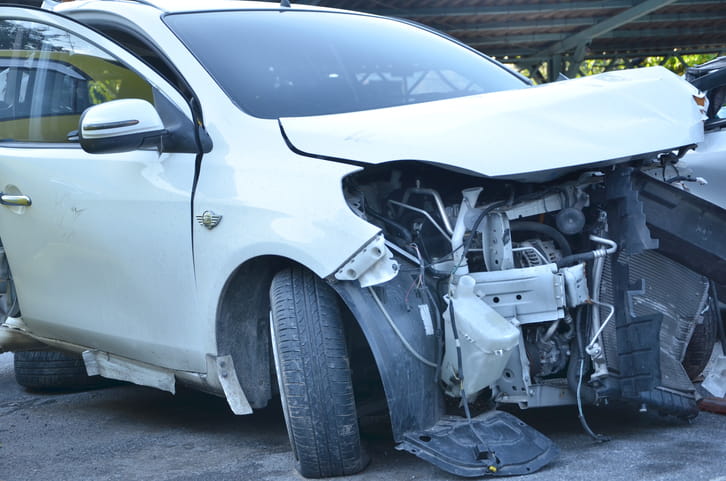How Long After A Car Accident Can Injuries Appear?

Being involved in a car accident can be one of the most traumatic experiences for anyone, regardless of how minor or severe the injuries may be. Regardless of whether you experience injuries immediately following the accident, contacting a car accident attorney as soon as possible is important to have someone in your corner to fight for your rights.
If you’ve experienced a car accident in any capacity, the reputable car accident attorneys at Bachus & Schanker will ensure you receive proper compensation for any damages or injuries you may have endured.
How long after a car accident can injuries appear?
Similar to how every car accident settlement is different, the same can be said for car accident injuries and how they may appear among victims. Some people may walk away from the car accident seemingly without a scratch, while others can suffer from catastrophic injuries immediately upon impact.
Common car accident injuries
While there are seemingly endless types of injuries that can result from a car accident, there are certain injuries that are significantly common among car accident victims. Some of the most common injuries car accident attorneys see in these types of lawsuits include the following:
- Broken ribs: Given the fragility of the ribs, it’s not surprising that broken ribs are common in car accident victims. If you suffer a rib injury, it can cause significant pain and difficulty breathing. Sometimes, car accident victims overlook broken ribs as just aches and pains. It’s important to be aware that broken ribs are possible in a car accident.
- Broken and dislocated hips: Broken and dislocated hips are common results following the sudden trauma of a car accident. These injuries can be debilitating for the victims since they often require long, slow recovery periods that call for multiple major surgeries. These injuries usually result in substantial compensation for victims, given the amount of damages that can be accounted for.
- PTSD/flashbacks: When you’re involved in a traumatic event, it’s common to suffer from post-traumatic stress disorder or flashbacks of the incident. It’s important to treat your mental injuries with the appropriate medical care and attention, just as you would treat physical trauma in a car accident.
- Anxiety and depression: Car accident victims often suffer from anxiety and depression. It can be hard to return to driving a car. You may feel depressed over the change in lifestyle that comes with your physical injuries. Mental injuries are very real, serious injuries that can occur in a car accident.
- Whiplash: The sudden movements of a car accident can cause a person’s head and neck to jerk in unnatural ways, regardless of whether the crash occurred at a low speed or high velocity. Injured muscles, tendons, and ligaments in the head and neck area are commonly known as whiplash. This type of injury is most commonly found in rear-end collisions.
- Scrapes and cuts: While seemingly not as extreme as other car accident injuries, scrapes and cuts have been known to cause real damage to car accident victims. Given the amount of broken glass that is typically involved in most car accidents, it’s not surprising that even the smallest pieces of glass can cause severe injury. Trauma from impact can also cause scrapes and cuts. Infection, loss of mobility, and blood loss can all be significant concerns when scrapes and cuts occur in a car accident.
- Concussion and traumatic brain injury: Concussion and traumatic brain injuries can range from minor to severe, making it very important for victims of these head injuries to monitor their symptoms closely. The sudden force that results from a car accident can cause the head to jerk forward, and even without direct impact to the head, this jerking movement can cause the brain to be slammed against the inside of the skull. Even without a skull injury, an internal brain injury can be a severe injury with potentially lifelong consequences.
- Bruises/internal bleeding: A common type of bruising resulting from car accidents is known as internal bleeding, which occurs when the bleeding occurs internally within the body. This type of injury is often serious, making it important to seek emergency medical attention when you have any car accident injuries because you may not be aware of a potentially serious injury like internal bleeding. It’s critical to seek emergency care to determine the full extent of your injuries.
- Herniated discs and spine injuries: The stress and force of a car accident can cause the spine to shift suddenly. A herniated disc is a very painful injury. Nerve pain, numbness, and tingling can all be problems associated with spinal injuries in a car accident.
- Knee trauma: Given the fragility of the knee, there are plenty of different ways a knee can be injured in a car accident. Torn ACL or MCL injuries are common issues involving a knee that stem from a car accident. Knee dislocations are another type of common car accident injury. Nearly all knee injuries require surgery, making them relatively traumatic for the victims.
Injury symptoms to look out for
There are many injury symptoms to be on the lookout for following a car accident, especially if you initially believe you walked away from the accident without any injuries. Any unfamiliar symptoms could indicate signs of brain trauma, internal bleeding, mental injuries, or more. If you’re feeling sore, uneasy, nauseous, or anything else out of the ordinary, be sure to speak with a medical professional right away, as it’s likely you’re experiencing symptoms of a delayed onset injury.
Delayed onset injuries following a collision
Delayed onset injuries following a collision are just as deserving of compensation as injuries immediately present when the accident occurs. Delayed onset injuries may be just as severe or catastrophic as any other injuries, making it important to seek medical attention and inform your legal counsel as soon as you notice any symptoms.
How long do I have to file an injury claim?
Colorado’s statute of limitations
Like any other personal injury lawsuit, your car accident lawsuit will be subject to the statute of limitations. In Colorado, the accident victim must file their car accident claim within three years after the date of the accident. Should the victim fail to bring their claim within the statute of limitations, they may be barred from filing the claim with the court.
Proving injury with delayed symptoms
Proving injuries with delayed symptoms can be difficult, which is why it’s essential to keep a detailed record of your symptoms and maintain regular contact with your primary treating physician. Since most car accidents result in delayed injury symptoms, our car accident attorneys are well-trained to include these injuries in their legal arguments when fighting to obtain proper compensation for your damages.
Let the experienced car accident lawyers at Bachus & Schanker help you

Our experienced car accident attorneys at Bachus & Schanker are well-versed in handling car accident lawsuits within the state of Colorado, making us the perfect choice to represent you in your Colorado car accident claim. Whether you have sustained severe or minor injuries, we are here to help ensure you have the representation you deserve while seeking justice and maximum compensation for your injuries.
Sources:
Goguen, D. Colorado Car Accident Laws.
Lee, C. What if my Accident Injuries Don’t Show Up Right Away?
O’Neill, C. Civil Statutes of Limitations.






